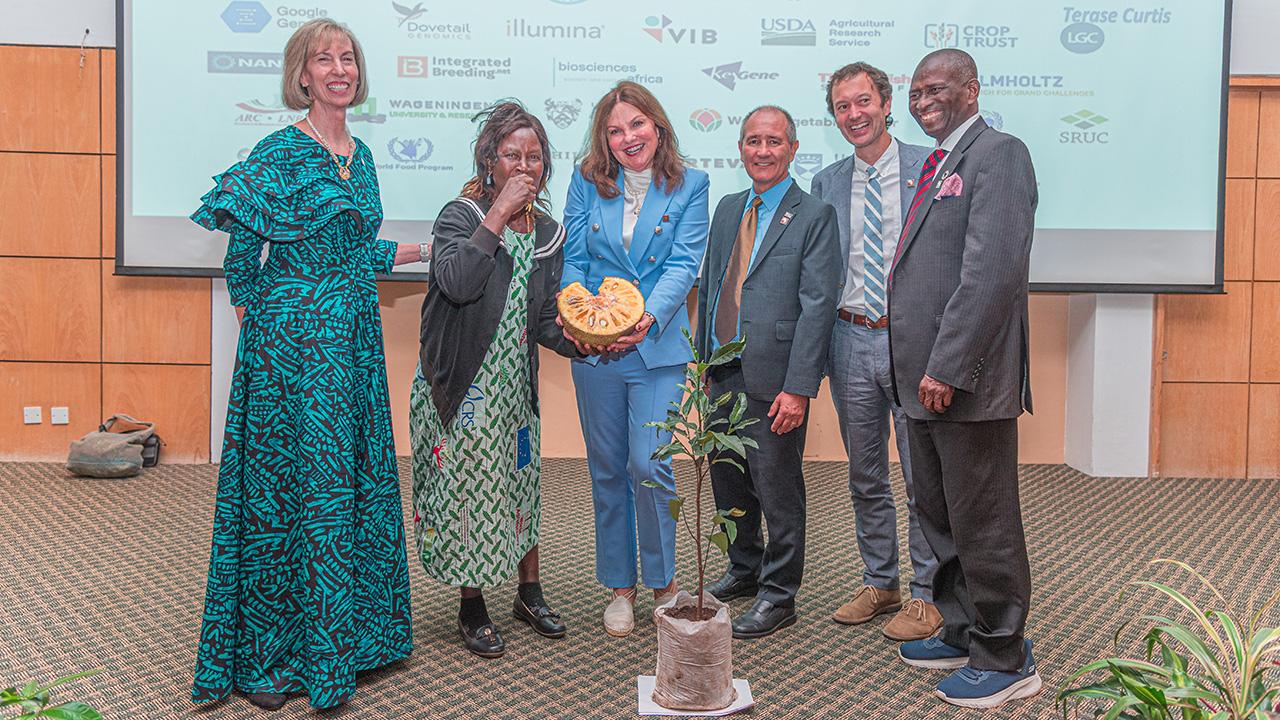Davis, California, USA
October 21, 2024
 Scientists, farmers, food security proponents and government officials gathered in Nairobi, Kenya, on Oct. 11 to continue momentum on efforts to develop traditional crops in Africa. At the gathering were, from left, Rita Mumm, director of capacity mobilization for the African Orphan Crops Consortium; Purity Njiagi, an innovative farmer from Embu, Kenya; Heidi Kühn (holding a jackfruit), 2023 World Food Prize Laureate; Allen Van Deynze, AOCC scientific director and part of the UC Davis Department of Plant Sciences; David Savage, of the UC Berkeley Innovative Genome Institute; and Ambassador Yaya Oleitan Olaniran, Nigeria’s representative to the United Nations Food and Agriculture Organization. (Courtesy Allen Van Deynze)
Scientists, farmers, food security proponents and government officials gathered in Nairobi, Kenya, on Oct. 11 to continue momentum on efforts to develop traditional crops in Africa. At the gathering were, from left, Rita Mumm, director of capacity mobilization for the African Orphan Crops Consortium; Purity Njiagi, an innovative farmer from Embu, Kenya; Heidi Kühn (holding a jackfruit), 2023 World Food Prize Laureate; Allen Van Deynze, AOCC scientific director and part of the UC Davis Department of Plant Sciences; David Savage, of the UC Berkeley Innovative Genome Institute; and Ambassador Yaya Oleitan Olaniran, Nigeria’s representative to the United Nations Food and Agriculture Organization. (Courtesy Allen Van Deynze)
Representatives from organizations linked through the African Orphan Crops Consortium met in Kenya recently and planted a jackfruit tree, symbolizing their goal of building a world where food security and peace go hand in hand.
Allen Van Deynze participated in the event, held in Nairobi in anticipation of today’s marking of World Food Day. Van Deynze is part of the UC Davis Department of Plant Sciences and scientific director of the AOCC. The consortium partners with international organizations to train and enable African scientists in the latest genetic tools to improve local crops. Their goal is to breed new varieties of 101 commonly grown and eaten crops that can remain nutritious and high-yielding despite the higher temperatures and water shortages expected from climate change.
In honoring World Food Day, participants called on world leaders to “support farmers in building resilience to climate shocks.” Heidi Kühn, the 2023 World Food Prize laureate, and Ambassador Gertrude Angote, of the United Nations Environment Program, also called on “wealthier nations (to) step up… (by) contributing resources, technology and political will to ensure that no one is left behind.”
“Food security and peace are not merely intertwined. They are foundational to each other,” Kühn and Angote said in a joint statement. “Without peace, hunger persists. Without food security, peace is fragile.”
They met on Friday, Oct. 11, at the World Agroforestry Center, one of AOCC’s partner organizations.
 This jackfruit tree sapling was planted on World Food Day, Oct. 16, in Nairobi, Kenya, at the Center for International Forestry Research and World Agroforestry, which is a partner in the African Orphan Crops Consortium. (Courtesy Allen Van Deynze)
This jackfruit tree sapling was planted on World Food Day, Oct. 16, in Nairobi, Kenya, at the Center for International Forestry Research and World Agroforestry, which is a partner in the African Orphan Crops Consortium. (Courtesy Allen Van Deynze)
The work of Van Deynze and others leading the AOCC is already bearing fruit: Scientists trained through the AOCC’s Plant Breeding Academy courses have released 143 varieties, 32 of which are African orphan crops. These are crops grown locally, but they are not commodity-scale crops that trade internationally, such as wheat and soybeans. And so, orphan crops typically don’t get a lot of resources for breeding improved varieties.
The AOCC seeks to buck that trend: Through the consortium, breeders’ broad vision is to develop a portfolio of crops that would allow small-scale farmers in Africa to harvest something every month, Van Deynze said.
“A call to action today is an easy thing to say, but we’ve been at it for about 12 years. A coordinated effort with global engagement is critical to achieve nutritional security for Africa.” Van Deynze said during a research presentation today at UC Davis. He is also director of the UC Davis Seed Biotechnology Center.
Food as a force for peace
Jackfruit is one of the orphan crops being developed by AOCC scientists. It is the largest of all fruits and rich in nutrition. The ceremony planting the jackfruit sapling symbolizes food security efforts and highlights the power of agriculture to solve humanity's most pressing problems, the World Food Day celebrants said.
To build resilient food systems that can both withstand climate change and soothe conflict, Kühn and Angote called on governments, organizations, businesses and individuals to:
- Enact policies that protect smallholder farmers and ensure equitable access to land and resources.
- Invest in education, technology, and infrastructure.
- Develop crops that tolerate drought.
- Promote farming techniques that are both sustainable and regenerative.
- Support agricultural programs that provide both food and employment.
Celebrants planted the jackfruit sapling in solidarity with related efforts to plant billions of trees across Africa.
By channeling the needed resources into developing orphan crops such as jackfruit, the AOCC has enabled projects such as the Vision for Adapted Crops and Soils. That's an initiative launched by Cary Fowler, the United States State Department's special envoy for global food security. Fowler has made orphan crops a centerpiece of his efforts to develop traditional sources of nutritious food, which also are well-adapted to a warming climate.
The African Orphan Crops Consortium is a coalition of 45 organizations, including the African Union, the United Nations FAO and the World Agroforestry Center, the AOCC's home base.